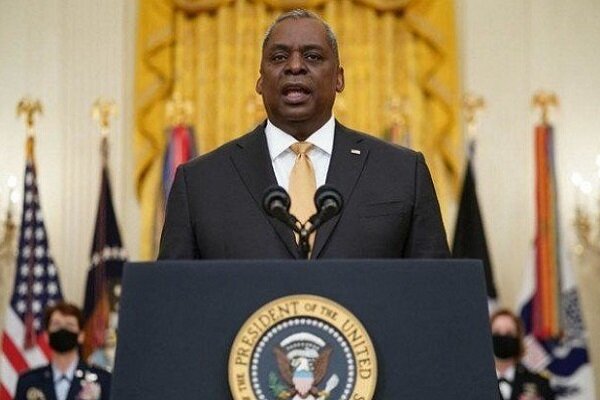Pentagon Chief: next major war will be much different

TEHRAN – In his first major policy speech on Friday, U.S. Defense Secretary Lloyd Austin claimed that the U.S. must prepare for a potential future conflict utterly different from what he called "the old wars" that have consumed the Pentagon for the past two decades.
Austin stressed the need for the U.S. military to move forward a faster and more innovative approach by harnessing emerging technological advancements and computing powers.
Speaking during a trip to the U.S. Pacific Command in Hawaii, Austin said, "The way we fight the next major war is going to look very different from the way we fought the last ones. Galloping advances in technology mean changes in the work we do to keep the United States secure across all five domains of potential conflict -- not just air, land and sea, but also space and cyberspace."
"What we need is the right mix of technology, operational concepts, and capabilities -- all woven together in a networked way that is so credible, flexible and formidable that it will give any adversary pause," he said, adding, "We need to create advantages for us and dilemmas for them."
"We can't predict the future," Austin said. "So, what we need is the right mix of technology, operational concepts, and capabilities - all woven together in a networked way that is so credible, so flexible, and so formidable that it will give any adversary pause."
According to the Press TV, although Austin did not mention any specific adversary by name, the impetus behind his speech was clearly a rapidly rising China, which has been increasingly intent on challenging the United States on multiple fronts, including in cyberspace.
Adversaries between the two countries mainly derive from the increasing pace of growth in China during the recent years and expand beyond merely economic dominance to include even military power, as some experts believe.
In a recent interview with the Tehran Times, Ashok Swain, a leading Indian academic, concluded that "China's major influence globally and in Asia will remain primarily economic; however, though China is still behind, it is on its way to surpassing the U.S. in military power with increased spending on weapons technology and developing several secretive weapons."
Calling China "recovered" from the covid-19, Swain continued, "China is not bound by the Immediate-Range Nuclear Forces Treaty (INF) between Moscow and Washington, and it has already acquired the largest number of ballistic missiles. China is particularly the world leader in medium-range missiles and has immense capability to strike with its nuclear weapons anywhere it wants. Though China is estimated to have only 320 nuclear weapons, but is a big unknown and has never given any number of its warheads officially. Nuclear weapons are also part of its ongoing project to modernize its military to close the gap with the U.S. China already has a larger navy than the U.S. China under President Xi has prioritized enhancing its military strength, and it will be foolish to downplay China; growing military power."
The expert believes "the concept of a monopolar world has disappeared for nearly a decade now, and the U.S. has already realized it," and the U.S. has already encountered the bitter truth about the new formation of the power in the world.
But as Swain puts it, the challenging issue for China in the near future might be "political stability," which can impact the countries' ability to expand relations. Swain believes, "There is no doubt that China has already become the global economic powerhouse, and it is expected to surpass the U.S. as the world's biggest economy by 2028 or even before. The former U.S. President Donald Trump's ally-alienating policies within NATO between 2017 to 2020 have pushed China's position upward firmly at the global power table. China is undoubtedly acquiring economic and military strength superior to the U.S. sooner than later. Still, there are some doubts over its internal political stability in the long run and its ability to make alliances with other regional powers in different parts of the world."
Though, many other experts believe that not only China doesn't see "inability to make alliances" as a challenge for its future, but even 'mere mutual cooperation' between China and some sensitive/powerful countries, including Iran, will neutralize many efforts the U.S. has put behind its policies.
In an interview with the Tehran Times, Richard Caplan, A professor of international relations at the University of Oxford, said that although the partnership between Iran and China may not change the balance in West Asia, it will undoubtedly affect the dynamics.
Caplan said, "The agreement, which predates Biden, undercuts U.S. efforts to isolate Iran economically and, to some extent, diplomatically. It also supports China's ambitions to extend its economic and strategic influence throughout Eurasia."
Such alliances will make things much more complicated for the U.S. and cast doubt on the countries' traditional methods of maintaining power in different realms. That said, Austin's "different war" can include various parties.
Leave a Comment